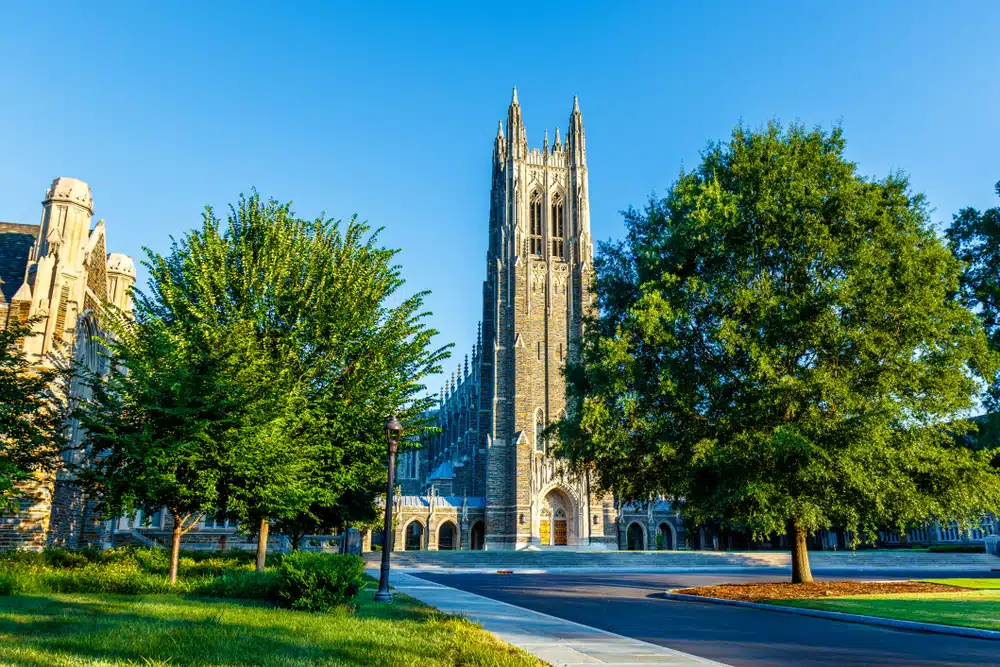Exploring the Experiences of Undergraduate Students at Duke University
Duke University is renowned for its exceptional academic programs, vibrant campus life, and wide range of extracurricular activities. As an undergraduate student at Duke, your experience is shaped by various factors, including the university environment, the role of extracurricular activities, support services available to undergraduates, and living arrangements and housing options. Let’s delve into these aspects and explore what it’s truly like to be an undergraduate student at Duke University.
Understanding the Duke University Environment
Duke University’s environment is dynamic and diverse, fostering a rich learning experience for students. The campus pulsates with energy, creating a stimulating and inspiring atmosphere. Whether attending a lecture in one of the historic buildings or engaging in group discussions on the sprawling lawns, you are immersed in an environment that encourages intellectual curiosity and growth.
Walking through the campus, you can feel the vibrant energy that permeates every corner. Students rush to their classes, backpacks filled with textbooks and notebooks, eager to absorb knowledge from their esteemed professors. The historic buildings stand tall, their architectural beauty a testament to the university’s rich history. As you pass by, you can’t help but imagine the countless lectures, debates, and discussions that have taken place within those walls.
But it’s not just the physical environment that makes Duke University unique. It’s the people who make up the community. Students from all walks come together, bringing their unique perspectives and experiences. This diversity enriches the learning environment as students learn from one another and broaden their horizons.
Campus Life and Culture at Duke
The campus life at Duke University is vibrant and offers numerous opportunities for personal and social development. With over 400 student organizations and clubs, there is something for everyone. Whether you have a passion for community service, want to join a cultural club, or are interested in a particular field of study, Duke provides a platform to explore your interests and connect with like-minded individuals.
Imagine yourself joining a club that aligns with your passion for environmental sustainability. You attend meetings, collaborate with fellow students, and work on projects that impact the campus and the surrounding community. Through these extracurricular activities, you enhance your skills, forge lifelong friendships, and create memories that will stay with you long after graduation.
But campus life at Duke is not just about clubs and organizations. It’s about the vibrant social scene that brings students together. Something is always happening on campus, from attending sporting events and cheering on the Blue Devils to participating in cultural festivals and celebrations. Community is palpable as students unite to support one another and create lasting bonds.
Academic Pressure and Expectations
As a premier academic institution, standards are high for undergraduate students at Duke. The academic pressure can be intense, with rigorous coursework and demanding assignments. However, the university provides extensive support and resources to help students excel academically, ensuring they have the tools they need to succeed.
Imagine yourself sitting in a library, surrounded by shelves filled with books and the sound of students flipping through pages. The academic atmosphere is palpable as students delve into their studies, seeking knowledge and pushing their intellectual boundaries. Professors are readily available for office hours, eager to guide students through challenging concepts and provide mentorship.
However, academic success at Duke is not just about individual achievement. It’s about collaboration and intellectual discourse. Students engage in lively debates, challenging one another’s ideas and expanding their understanding of the world. The academic pressure, although demanding, fosters a sense of intellectual growth and prepares students for the challenges they will face beyond the university.
Social Opportunities and Challenges
While excelling academically is vital, Duke University recognizes the importance of a well-rounded college experience. The university strikes a balance between academic life and social opportunities. Socializing and making friends is an integral part of the Duke experience but can also present challenges. Building new relationships and finding your niche within such a diverse community can take time, but the university provides support and guidance to help students navigate these social challenges.
Imagine attending a campus event surrounded by students from different backgrounds and cultures. The air is filled with laughter and conversations as undergraduate students at Duke share their stories and experiences. Making friends becomes an adventure as you meet people who challenge your perspectives and broaden your understanding of the world. The university offers various programs and initiatives to foster inclusivity and create a sense of belonging for all students.
However, navigating the social landscape can also present challenges. Feeling overwhelmed or out of place in a new environment is natural. But at Duke, you are not alone. The university provides resources such as counseling services and student support groups to help students overcome these challenges and thrive socially.
As you embark on your journey at Duke University, you will immerse yourself in a vibrant and intellectually stimulating environment. The campus, the people, and the opportunities will shape your college experience and prepare you for a future filled with endless possibilities.
The Role of Extracurricular Activities
Extracurricular activities play a significant role in shaping the undergraduate experience at Duke University. These activities go beyond the classroom, allowing students to pursue their passions, develop leadership skills, and make lasting connections. Duke offers a wide range of extracurricular options to cater to diverse interests.
Engaging in extracurricular activities at Duke University is not just about filling up your resume; it’s about exploring your interests and expanding your horizons. These activities provide a platform for personal growth and self-discovery, allowing you to delve into areas not covered in your academic curriculum.
Sports and Fitness Opportunities
Duke’s athletic programs will captivate you if you are a sports enthusiast. The university boasts top-notch facilities and a strong emphasis on sports. From varsity teams to recreational sports clubs, there are ample opportunities to stay active and engaged in physical activities.
Participating in sports helps you stay fit and teaches you valuable life skills such as teamwork, discipline, and perseverance. Whether you’re a seasoned athlete or a beginner looking to try something new, Duke’s sports and fitness opportunities cater to all skill levels and interests.
Arts and Culture Clubs
Duke’s thriving arts scene allows undergraduate students at Duke to pursue their creative interests. The university hosts various cultural clubs, performing arts groups, and exhibitions throughout the year, allowing students to showcase their talent and immerse themselves in a rich artistic community.
Joining an arts or culture club at Duke opens doors to new experiences and perspectives. Whether you’re passionate about painting, photography, theater, or music, there’s a club or group that will nurture your artistic talents and provide opportunities to collaborate with like-minded individuals.
Volunteer and Community Service Groups
Duke University believes in giving back to the community and encourages students to volunteer. Numerous service organizations provide students opportunities to make a difference in the Durham community and beyond. Whether you’re passionate about education, healthcare, or environmental sustainability, a community service group at Duke aligns with your interests.
Engaging in volunteer and community service activities benefits the community and helps you develop empathy, compassion, and a sense of social responsibility. Duke’s commitment to service ensures that you have the resources and support to create meaningful change and contribute to causes you are passionate about.
Extracurricular activities at Duke University are not just an addition to your academic journey; they are an integral part of it. These activities provide a well-rounded education that goes beyond textbooks and lectures. They offer opportunities for personal growth, skill development, and the chance to positively impact the world around you. So, whether you’re an athlete, an artist, or a community advocate, Duke’s extracurricular offerings will enrich your college experience and shape you into a well-rounded individual.
Support Services for Undergraduates
Duke University provides a comprehensive range of support services to ensure its students’ success and well-being. These services are designed to address the various needs of students and support them in their academic, mental health, and career development journeys.
Academic Support and Resources
Duke offers academic advisors who are dedicated to helping students navigate challenging coursework. These advisors provide personalized guidance and support, assisting students in making informed decisions about their educational paths. In addition to academic advisors, Duke also offers peer tutoring programs and study groups. These resources allow students to collaborate with their peers, share knowledge, and enhance their understanding of the course material. Furthermore, the university provides access to libraries, research facilities, and online resources. These resources enable students to deepen their knowledge, research, and pursue academic excellence.
Mental Health and Wellness Services
Duke University recognizes the importance of mental health and offers comprehensive counseling and wellness resources. Trained professionals are available to guide and support students, ensuring their emotional well-being throughout their college journey. The university’s counseling services offer individual counseling sessions, group therapy, and workshops on stress management and coping strategies. Additionally, Duke promotes a culture of wellness through various initiatives, such as mindfulness programs, yoga classes, and wellness fairs. These resources empower students to prioritize their mental health and develop healthy habits that will benefit them long after Duke.
Career Guidance and Internship Opportunities
Duke has a strong commitment to preparing students for successful careers. The university’s career center offers comprehensive career counseling services, helping students explore their interests, skills, and values to make informed career decisions. The career center also provides resume workshops, interview preparation sessions, and networking events. These resources equip students with the necessary tools and skills to navigate the job market and secure internships and employment opportunities. Duke’s extensive alumni network also plays a crucial role in students’ career development. Alumni mentors provide valuable insights, guidance, and connections, giving students a head start in their chosen fields.
Overall, Duke University’s support services for undergraduates go beyond the classroom, ensuring students have access to the resources and support they need to thrive academically, mentally, and professionally. These services are integral to the university’s commitment to student success and well-being.
Living Arrangements and Housing
Where you live plays a significant role in shaping your college experience. Duke University offers a range of housing options to suit different preferences and needs.
Living arrangements and housing are an integral part of the college experience at Duke University. The university recognizes the importance of providing students with comfortable and convenient housing options, contributing to their overall well-being and academic success.
Duke University understands that students have diverse preferences regarding their living environment. To cater to these preferences, the university offers a variety of on-campus housing options, including residence halls, apartments, and living-learning communities. These options allow students to find a living space that aligns with their lifestyle and needs.
On-Campus Housing Options
Duke provides various on-campus housing options, each with unique features and benefits. The residence halls offer a traditional college experience, with shared living spaces and opportunities for vibrant social interactions. Students living in residence halls have the chance to build strong connections with their peers and engage in university events and activities.
In addition to residence halls, Duke University also offers on-campus apartments. These apartments give students more independence and privacy while being part of the university community. Living in an on-campus apartment allows students to have their own space while conveniently located near academic buildings and campus amenities.
Another on-campus housing option available at Duke is the living-learning community. These communities are designed to bring together students with similar academic or personal interests. Living in a living-learning community allows students to engage in collaborative learning experiences and build strong relationships with their community members.
Off-Campus Living and Commuting
While on-campus housing options are popular among students, some live off-campus. Duke University recognizes and supports this choice by providing resources and assistance to students who prefer to live in apartments near the university or surrounding areas.
Living off-campus can offer a different experience, allowing students to explore the local community and gain independence. Many students who live off-campus find it beneficial to have a separate space from their academic environment, providing a sense of balance between their college life and personal life.
Commuting to campus from off-campus locations is common at Duke University. The university understands the importance of accessibility and convenience for off-campus students. To facilitate ease of access, Duke provides convenient transportation options, such as shuttles and public transportation, ensuring students can easily travel to and from campus.
The Impact of Housing on Student Experience
Where you live can profoundly influence your college experience. Your environment can shape your social interactions, study habits, and overall well-being. Duke University recognizes the importance of creating a supportive and inclusive living environment that fosters student success and satisfaction.
Living on campus offers numerous benefits beyond the convenience of being close to classes and campus facilities. It provides opportunities for students to form lasting friendships, engage in extracurricular activities, and fully immerse themselves in the university community. The residence halls and living-learning communities foster students’ sense of belonging and camaraderie, creating a supportive network beyond the classroom.
For students who live off-campus, the university understands the need for a smooth transition and integration into the Duke community. Duke University offers various resources and programs to help students feel connected and engaged off-campus. From off-campus student organizations to events specifically designed for commuter students, Duke ensures that all students, regardless of their living arrangements, have the opportunity to thrive academically and socially.
In conclusion, living arrangements and housing options at Duke University are designed to enhance the college experience and contribute to student success. Whether students live on-campus or off-campus, Duke provides a supportive and inclusive environment that fosters personal and academic growth. The university’s commitment to creating a diverse and engaging living environment ensures that students can make the most of their time at Duke and create lifelong memories.
If you want to discuss the matter to a greater extent or inquire about college admissions, look no further! Our experts here at AdmissionSight can help you! Here at AdmissionSight, we have over a decade’s worth of experience guiding students through the competitive admissions process to get accepted to the top universities in the world. Feel free to set up an appointment today to book your initial consultation.









































